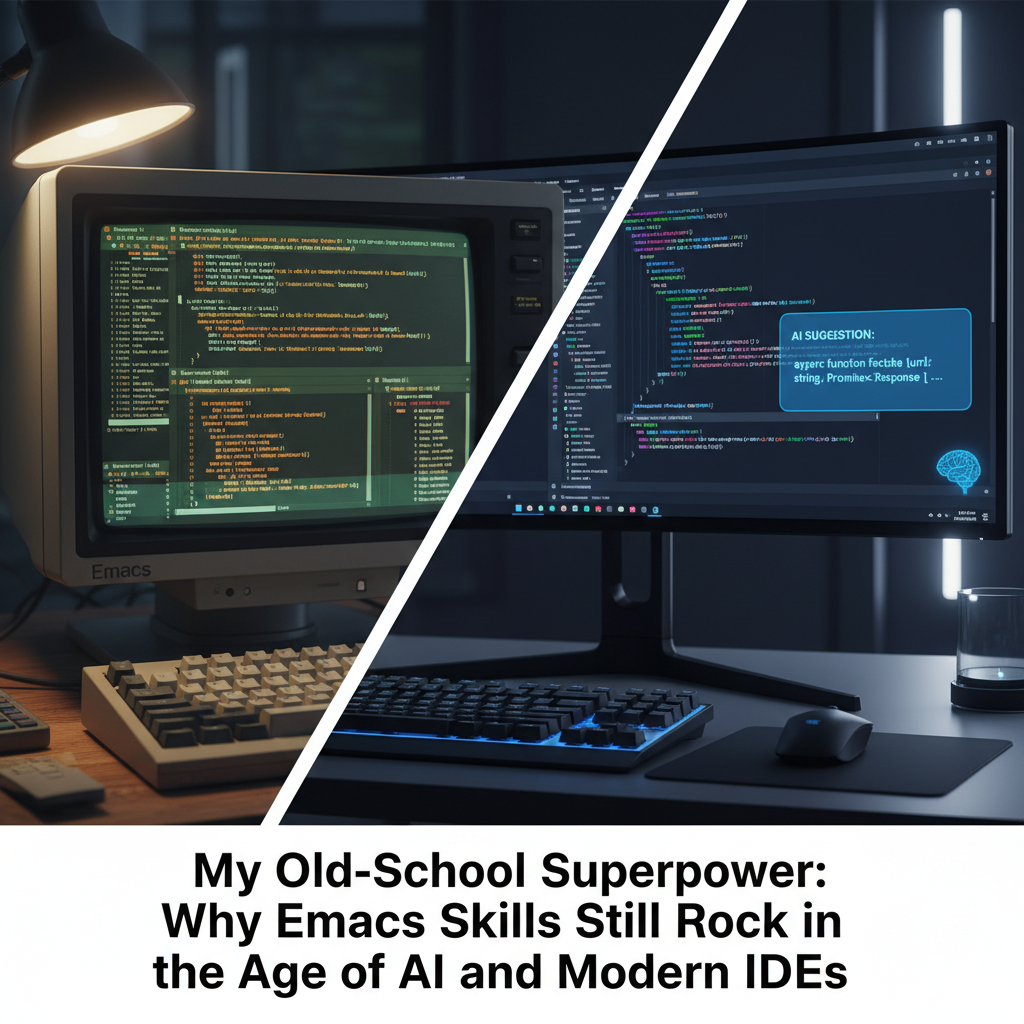My Old-School Superpower: Why Emacs Skills Still Rock in the Age of AI and Modern IDEs
It’s funny how specific skills stick with you. Recently, I found myself SSH’d into a virtual server, needing to tweak some configuration files. Without thinking, my fingers danced across the keyboard, opening multiple Emacs buffers (what some might call “tabs”), copying and pasting text, and performing complex multi-edits. It was like riding a bike – a skill I honed during my university days, but one I hadn’t actively used in years, preferring the comforts of modern IDEs like VS Code or the latest JetBrains offerings. This experience got me thinking: In a world dominated by feature-rich IDEs and the incredible rise of AI-powered code generation, are these “old-school” terminal editor skills still relevant? Do I really need my Emacs superpower anymore? My conclusion? Absolutely, yes. And here’s why I believe these foundational text-editing skills are more critical than ever.

The Unavoidable Command Line: Your Server’s Best Friend
Modern development often involves working with remote servers, cloud instances, and containerized environments. Whether it’s AWS, Azure, Google Cloud, or your own local Docker setup, there will be times when a full-blown graphical IDE isn’t an option.

Here, SSH and a text editor like Emacs (or Vim, if that’s your flavor) become your primary interface. Need to quickly adjust a Nginx config, check a log file, or fix a critical bug in a script running on a production server? You won’t have to drag and drop files with your mouse. Your proficiency with terminal commands and an efficient text editor will be your most valuable asset. It’s the digital equivalent of being able to fix your own car instead of always relying on a mechanic – essential for quick diagnostics and repairs.
Beyond Basic Editing: Multi-editing as a Superpower
The ability to perform multi-edits, copy/paste efficiently across different files, and manipulate large blocks of text with precision is a core skill that transcends any specific tool. While modern IDEs have excellent multi-cursor support, the underlying principles of text manipulation (using regular expressions, macros, or strategic block selections) are what truly matter.

Whether I’m refactoring a large codebase, transforming data, or cleaning up automatically generated content, these multi-editing techniques save immense amounts of time. My Emacs background instilled a deep appreciation for this kind of efficiency, and those techniques are directly transferable to any advanced text editor.
AI is a Co-Pilot, Not an Auto-Pilot
The rise of AI tools like GitHub Co-Pilot and ChatGPT is revolutionary. They can suggest code, complete functions, and even generate entire boilerplate sections, drastically speeding up the initial coding process. But here’s the crucial point: AI is a co-pilot, not an autopilot.

AI-generated code needs review, debugging, and often significant refinement to integrate seamlessly into an existing project. It may introduce subtle bugs, security vulnerabilities, or fail to adhere to your team’s coding standards. It is where your foundational text-editing skills come back into play. You need to be able to efficiently navigate, understand, and surgically modify the AI’s output. The more adept you are at manipulating text, the more effectively you can leverage AI as a productivity enhancer rather than a crutch.
Versatility in a Diverse Tech Landscape
The tech world is incredibly diverse. You might find yourself working on a brand new JavaScript framework one day, and then maintaining an ancient Perl script on a legacy system the next. A developer who can adapt to various environments and tools is an invaluable asset. Being comfortable in a text-only terminal environment demonstrates a fundamental understanding of computing that goes beyond any specific IDE’s graphical abstractions. It means you’re not locked into a single ecosystem, giving you incredible flexibility and resilience in your career.
My Takeaway: The Hybrid Developer
Ultimately, the most effective developers in the coming decade won’t be those who exclusively use modern IDEs or solely rely on AI. They will be “hybrid developers” – those who can leverage the power of AI and sophisticated IDEs for speed and convenience, but who also possess the deep, foundational skills to work in any environment, debug complex issues, and meticulously refine code. My old-school Emacs superpower isn’t just a nostalgic trick; it’s a vital part of my toolkit that continues to pay dividends. So, if you’re starting or contemplating brushing up on those terminal editor skills, I say go for it. They’re not going anywhere, and they’ll make you a more versatile, capable, and efficient developer in the long run. What are your thoughts? Do you still use terminal editors, or have you fully transitioned to modern IDEs?
